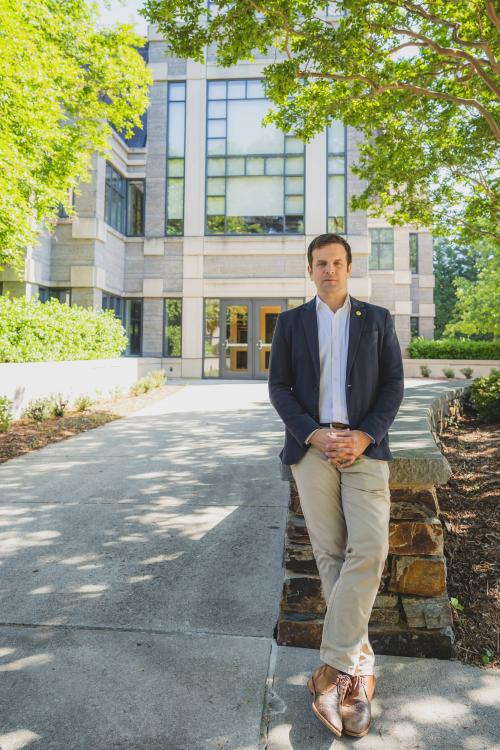
Before joining the Master of International Development Policy (MIDP) program at Duke Sanford, Jorge Delgado Golusda served 18 years in the Chilean Army, with his most recent position being head of the planning and investigation section in the education division.

“One of the key aspects of our work in Chile – apart from the obvious one, which is defense – is to work towards the country’s development,” Jorge says. “This aspect changes according to the country’s needs. Education, road construction in isolated areas and humanitarian aid or disaster relief operations are some of our efforts. This also happens abroad, where we focus on international cooperation as part of Chile’s state strategies in peacekeeping missions and other areas.”
“Due to the nature of my work, which is essentially practical, groundwork, I wanted to study something that could complement it and add more technical skills to reach a higher decision-making level,” Jorge shares. “Studying international development policy was a necessary step to take my expertise to the next level.”
During his time as an MIDP fellow, Jorge studied the potential implications of the use of the armed forces as a state’s extreme solution to managing migration issues. His research for his master’s project, “Balancing Border Security and Human Rights: Strategies for Chile's Use of the Armed Forces for Irregular Migration Management,” showed an increase in the physical danger both for migrants and soldiers deployed on the border. He found the armed forces did not help in the reduction or containment of irregular migration, but rather increased it. “Even though the armed forces can be used to manage migration, they are not educated or trained in migration management,” Jorge explains. “The use of the armed forces can only be a temporary solution in the search for a feasible, long-term one.”
Jorge learned the theory of migration and its implications around the world during the “Migration Policy and Development” course taught by Kerilyn Schewel. “Migration is one of today’s most pressing issues for governments and societies alike,” Jorge says. He credits the class for inspiring his master’s project topic.
Beyond the classroom, Jorge served as co-president of the Sanford Latin American and Caribbean group, which received the Graduate and Professional Student Group of the Year award from the Duke International Student Center. He participated in the Duke Global Policy Program in Geneva, served as a teaching assistant for a Duke Center for International Development (DCID) executive education program, and completed a research assistantship for DCID’s Anti-corruption Learning Agenda report for USAID. He also interned with PartnersGlobal, a Washington, D.C.-based international NGO, where he worked with communities and local authorities in Central America on courses related to mediation and conflict transformation. Additionally, Jorge is a Rotary Peace Fellow with the Duke-UNC Rotary Peace Center.
Reflecting on his Duke MIDP experience, Jorge shares: “The program gave me the tools to be part of the decision-making process by advising or designing policies that are in my areas of expertise. It also made me gain great insight from our diverse cohort in terms of nationalities and backgrounds. These experiences are valuable inputs that will have an impact on my professional experience, and hopefully, I can use them to make an impact in my country or in new professional avenues in the areas of international development or humanitarian aid.”
Q&A with Jorge Delgado Golusda
What’s your favorite part of being an MIDP fellow?
The possibility to engage with a fabulous cohort that brought to the classroom a wealth of experience and knowledge and learn from them as well as our faculty about current global pressing issues in a wide range of areas.
What is your advice for incoming MIDP fellows?
Time will fly these two years. Take the opportunity to engage as much as possible with administrative personnel, faculty and classmates and learn from their years of experience in the field. Understand the flexible nature of the curriculum of the program and use it to tailor the program to your needs and interests. You will be supported all along this journey. Finally, enjoy the ride in one of the best schools in the world!
What is a “changemaker?"
Someone who can have a positive effect on the system where this person works. This doesn’t mean it has to be a profound effect. But if there is an opportunity to make some impact, despite how small it could be, it’s a start. From then onwards, it can only be bigger and better.
The Master of International Development Policy (MIDP) program is a self-designed, interdisciplinary degree that equips mid-career professionals from around the world with the analytical tools and technical expertise necessary to become global leaders in sustainable development efforts. It is administered by the Duke Center for International Development (DCID), which is based in the Sanford School of Public Policy. DCID promotes sustainable development through its research, education and engagement with students, policymakers, practitioners, development partners, civil society, and the private sector.
Graduation Stories & Details
We will be sharing graduation stories throughout the week leading up to graduation on Sanford's website, and on our social channels. Need the graduation details? Check out the official Graduation Page to find parking info, live streams and more.

